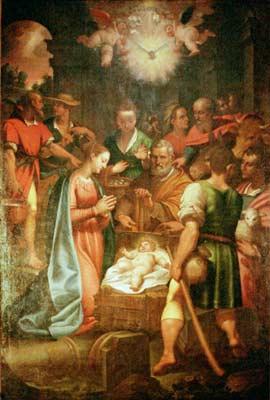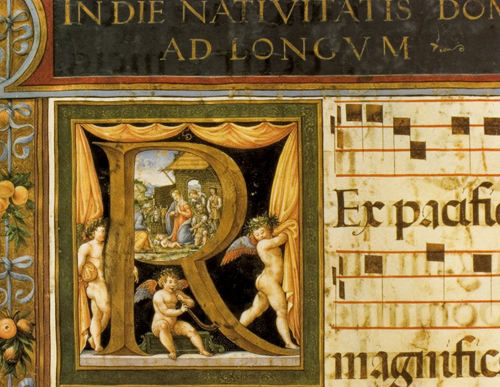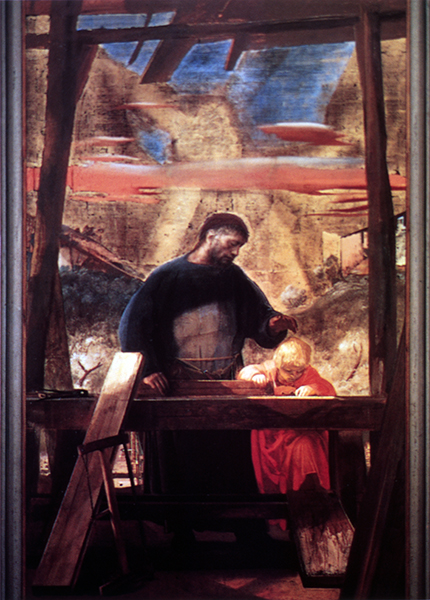These are the reasons for the reflection which we are about to undertake focused on St. Joseph in the Birth of Jesus, according to the Gospels, the Magisterium and the teachings of our holy Founder, St. Joseph Marello.
1. ” They went in haste and found Mary and Joseph and the infant, who was laid in a manger “. (Lk 2,16)
The visit of the shepherds of Bethlehem is the only moment in which the Gospel account of the Birth of Jesus explicitly presents St. Joseph. However, the references which the Gospel makes regarding St. Joseph during the Birth of Jesus are several. We will examine some from Matthew.
In the genealogy we read: “…Jacob was the father of Joseph, the spouse of Mary, from whom Jesus called the Christ was born” (Mt 1,16). In the story of the “Birth of Jesus” (Mt 1,18-24) Joseph accepts fatherhood: “She (Mary) will give birth to a son, and you will call him Jesus” (Mt 1,21), “(Mary) will give birth to a son whom you (Joseph) will name Jesus” (Mt 1, 24). We know that for the Hebrews, to bestow the name was to acknowledge fatherhood. In this case, however, there is an entirely different situation: because Joseph does not speak of, nor does he mean the act of generating.
In Matthew the Angel clearly says to him: “…that which is conceived in her is of the Holy Spirit” (Mt 1,20). Afterwards it says: “(Joseph) took his wife unto himself, who without him having known her, gave birth to a son and he called him Jesus” (Mt 1,24). In Luke (1,26-35), when the “virgin” Mary poses the question: “How is this possible? I do not know man”, the Angel responds: “the Holy Spirit will descend upon you and you will be overshadowed by the power of the Most High. He who will be born will therefore be called Son of God”.
Therefore the Child born of Mary does not come from any man. He “comes” from the Holy Spirit, He was conceived by the work of the Holy Spirit.
Yet all the references that the Gospel makes regarding the fatherhood of Joseph indicated a genuine fatherhood, even if not natural. It is not adoptive fatherhood, because Jesus is not the son of any other man, nor is it only legal or juridical, because while Joseph is recognized to be such by the Law and by man, instead he is such because it is the will of God who inserts him into human nature and into the family of Jesus with all the human attributes of a father for his son. Thus it is both a fatherhood of the heart, for the sentiments and paternal action of Joseph towards Jesus ( “Your father and I searched for you with anxiety” Lk 2,48) and an educational fatherhood through Joseph’s teaching Jesus so as to be called “son of the carpenter”.
2. “He (Joseph) had as his spouse, the Immaculate Virgin Mary, from whom was born, by the power of the Holy Spirit, our Lord Jesus Christ, who among men deigned to be known as the son of Joseph, and was subject to him.”
This is what the Decree Quemadmodum Deus said on December 8, 1870, which by the will of Pius IX declared St. Joseph Patron of the Catholic Church. All the documents of the Magisterium which speak of St. Joseph, highlight what he was as the Spouse of Mary and above all what he was to the Son, both infant and adolescent. Among many examples we will chose a few, and in part, which are still useful for our reflection on the fatherly relationship between St. Joseph and his Divine Son.
The same Decree adds, with some emotion: “and He, whom so many kings and prophets longed to see, Joseph not only saw, but he lived with him with fatherly love, embraced and kissed Him, and in addition nourished with the greatest care Him whom the faithful would eat as the bread come down from Heaven to obtain eternal life.”
St. Paul VI, in one of his Allocutions on St. Joseph, from March 19, 1964, considers the fact that “St. Joseph gave to Jesus a civil status, a social category, an economic condition, professional experience, a family environment and a human education.”
St. John Paul II in his Apostolic Exhortation Redemptoris Custos (August 15, 1989), especially in n. 8, focuses on the fatherhood of Joseph: a fatherhood which is messianic, human and authentic. “Joseph is he whom God chose to be the ‘orderer of the Birth of the Savior,’ the one who has the task of providing the orderly insertion of the Son of God into the world, with respect to both divine dispositions and human laws. All of the ‘private’ or ‘hidden’ life of Jesus is entrusted to his care.”
3. “O glorious Patriarch St. Joseph….You who after the Blessed Virgin were the first to hold Jesus to your heart, be our exemplar in our own ministry, which like your own, is a ministry of intimate relationship with the Divine Word.”
This is the confidant prayer of our holy Founder in letter 37 to Fr. Giuseppe Riccio on the occasion of March 19, 1869. The relation of St. Joseph with the Child Jesus, a connection of “intimate relationship” becomes an “exemplar” for the priestly ministry, but also, we would say, for the life of every Christian, a personal and intimate relationship with Jesus.
We will also add the reference of the Founder regarding the declaration of St. Joseph as Patron of the Catholic Church. In letter 64, still to Fr. Giuseppe Riccio dated March 17, 1870, the “pre-vigil of our Patron Saint,” written from Rome (we are during Vatican Council I), he feels swept up in those “moments in which devotion to the Head of the Holy Family is about to reach its highest development thanks to the petitions made by all Christendom to the Fathers of the Vatican Council.” The petitions for the proclamation of St. Joseph to be Patron of the Universal Church were from 38 Cardinals, 153 Bishops and 43 Superiors General. These “moments” were, for the young priest Giuseppe Marello, a special occasion for prayers and devotion to St. Joseph “so that beginning with his exaltation in our hearts, we may become more worthy of seeing him exalted soon by all Christendom with the title which is being prepared for him as Patron of the Universal Church.” For Marello, Josephite spirituality cannot but be an ecclesial spirituality.
Think of art. 4 of our Constitutions, that which speaks of the “apostolic goals of the Congregation.” “In the apostolate of the Oblates, St. Joseph will be an ‘exemplar of their ministry’…” The third “goal” is “the spread of the spirituality of and devotion to St. Joseph, through the witness of a poor and work filled life, and with the task of making the Guardian of the Redeemer known among Christian people.”
Reflecting on St. Joseph in the Birth of Jesus can be a useful aide to our celebrating Christmas this year, while we all the more entrust ourselves to the protection and intercession of our Patron also during the tragic pandemic we are living in. Therefore, as a greeting and an act of Christian confidence, it is always good and we desire to make our own, the Founder’s concluding acclamation from his letter of March 17, 1870: “Viva(long live) St. Joseph, along with those devoted to him!”
Fr. Ferdinando Pentrella, OSJ





